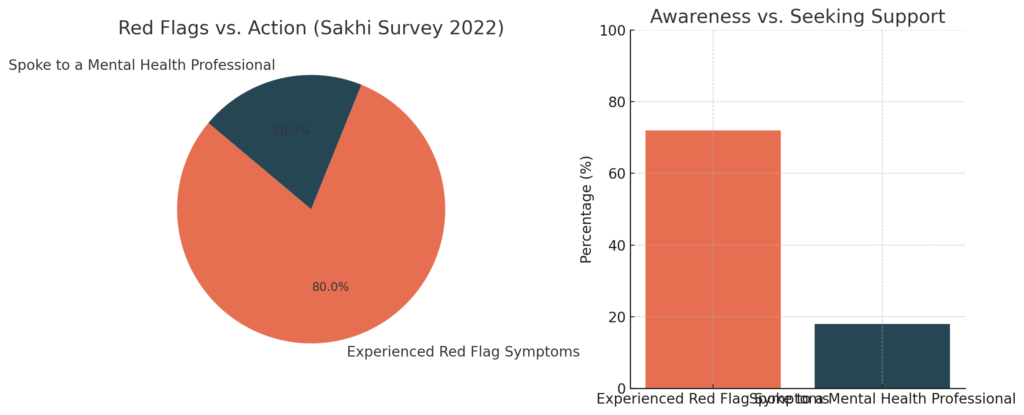
🧱 “It’s Just Stress.”
In many South Asian households, the early signs of mental health issues are brushed aside — labeled as laziness, moodiness, or overthinking. What the West might call symptoms, we were taught to ignore, endure, or spiritualize away.
🚩 The Red Flags We Missed
Growing up, we weren’t taught how to recognize mental distress — especially when it came in quiet, insidious forms. Here are just a few red flags many of us were told not to worry about:
| 🚨 Red Flag | 🙅🏽♀️ How It Was Dismissed |
|---|---|
| Withdrawing from social activities | “She’s just being dramatic.” |
| Sleeping too much or too little | “Lazy. Get up and be productive.” |
| Feeling numb or emotionally flat | “Everyone gets tired — stop being weak.” |
| Constant worry or panic | “Just pray, it’ll go away.” |
| Crying frequently or irritability | “Hormones. You’re just sensitive.” |
| Difficulty concentrating | “You’re distracted because of your phone.” |
📊 In a 2022 survey by Sakhi for South Asian Women, 72% of respondents reported experiencing at least one mental health red flag — yet only 18% had ever spoken to a mental health professional.
💬 Real Words, Real Silence
Ayesha, 30, remembers being told:
“You’re not depressed. You just need to do yoga and stop being so negative.”
Rahila, 19, shared:
“When I said I felt empty, my mom said I should clean my room. I think that was her way of helping, but it didn’t help.”
These red flags don’t always scream — sometimes they whisper. And in cultures where silence is strength, those whispers often go unheard.
🧠 The Emotional Education We Missed

Pie Chart: Shows the contrast between women who experience mental health red flags and those who seek professional help.
Bar Chart: Highlights the same data in a more direct, side-by-side format.
Instead of learning how to name our feelings, many of us learned to mask them. Instead of seeking support, we learned to suppress. But it’s not too late to unlearn.
What we weren’t taught:
- Sadness can mean more than just a bad day.
- Exhaustion can be emotional, not just physical.
- Healing isn’t selfish — it’s survival.
🛠️ What We Need to Change
To shift the narrative, we need:
- Mental health education integrated into our communities
- Supportive family dialogues, not silence
- Community spaces where women of color can share without judgment
- Representation in care: South Asian therapists, culturally aware services
❤️ A Note to Our Younger Selves
You were never “too sensitive.”
You weren’t lazy or dramatic.
You were hurting — and you deserved care.
And now, as adults, we owe it to ourselves to pay attention to those red flags.
To listen.
To validate.
To heal.
No Responses